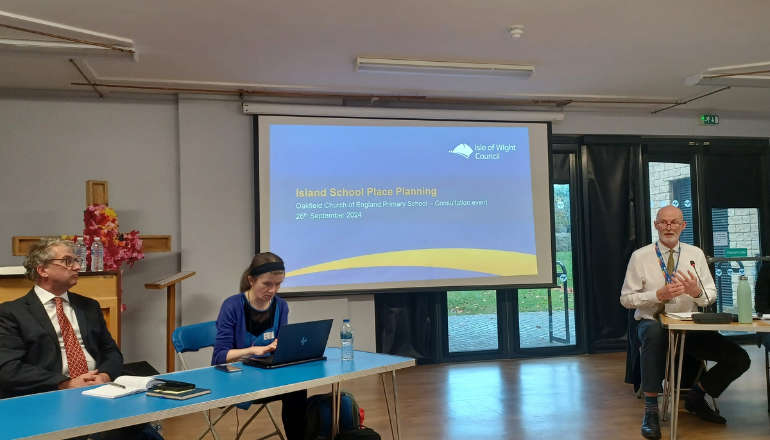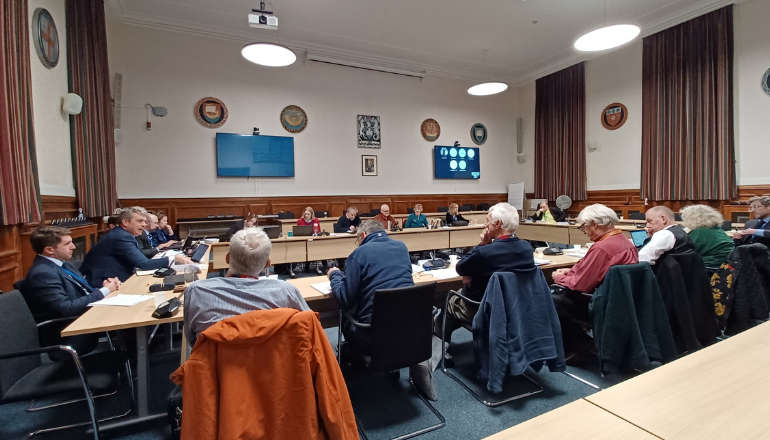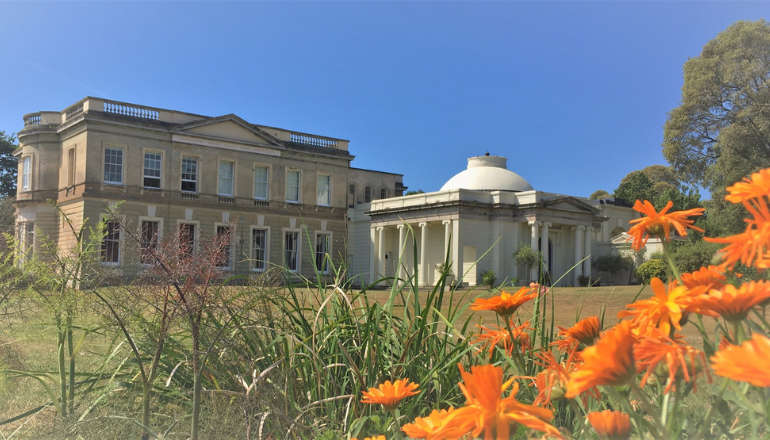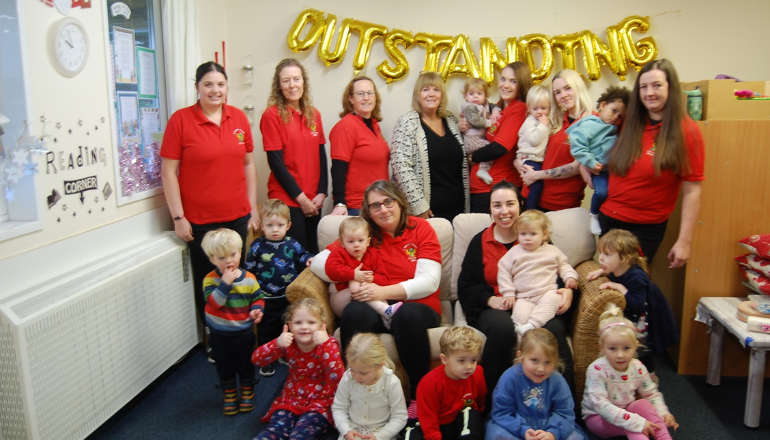
The team behind the Isle of Wight Council’s contentious school plans headed to a Ryde school yesterday for a consultation event discussing its possible closure.
Council officers including Ashley Whittaker presented the Island’s school place planning proposals for 2023 to 2030 and faced questions from concerned Oakfield Church of England (CE) Primary School parents.
Cabinet member Jonathan Bacon was present in what he described as a “listening capacity”.
The meeting also heard from Rob Saunders, deputy diocesan director of education at CE’s Diocese of Portsmouth, and a presentation from Oakfield’s school governing body which set out its opposition to a possible closure on the basis of “flawed” information and criteria used by the council.
Mr Saunders thanked the school’s staff and governors for the “quality” of its “distinctively Christian ethos” and highlighted the “outstanding” result the school received from a recent church school inspection.
Since the cabinet gave approval on September 12, the council has embarked upon on a consultation to gather views on proposals to reduce surplus primary school places and expand Special Educational Needs and Disabilities (SEND) provision as part of developing a new Island education strategy.
Both Cllr Bacon and Mr Whittaker have said the current oversupply of places is “inefficient”, “unsustainable” and holds back children's educational outcomes.
The proposals include a SEND expansion plan in response to an “above national rise” in young people with special educational needs and previous underinvestment in SEND provision.
Plans under consultation also include the possible closure of Arreton CE Primary School, Brading CE Primary School, Cowes Primary School, Wroxall Primary School and Godshill Primary School.
In a solemn introduction similar to that delivered in Cowes on Monday, Mr Whittaker acknowledged the sensitivity and difficulty of the process now underway for “all those involved”.
He also said the council was committed to proceeding with as much “compassion and kindness” as possible.
One parent said:
“My son is SEN with an ECHP – like many of the children here who have been managed out of their previous schools because they don’t have that training and ability to support them.
“They’ve already been through a significant transition – my son quite recently last March.
“There are many children who’ve already attended one or two or three other primary schools before reaching here.
“And subjecting them to such a traumatic transition again is going to be very detrimental to them.
“I’d love to see some more specific information around how we are going to support those vulnerable children.”
Strategic manager for SEND and Inclusion Heather Morris responded:
“We haven’t given the details at this point around how we would support a transition.
“We’ve outlined it because that’s been something we’ve been asked – but we don’t want to look at specifics at this point because that would mean that we’re preempting the outcome of this process.
“Once we know what the outcome is, then we will work with individual schools.
“We will know young people that are known to us from the statutory perspective but we will also ask the school to identify any other children, families that are vulnerable for different reasons and we would then create a plan from there.
“And we would continue this engagement.”

 Engine Problems Lead To Yarmouth RNLI Callout To Osborne Bay
Engine Problems Lead To Yarmouth RNLI Callout To Osborne Bay
 Ryde Academy Students Donate To Two Worthy Causes At Christmas
Ryde Academy Students Donate To Two Worthy Causes At Christmas
 Road Improvement Works To Get Underway From The Very Start Of The New Year
Road Improvement Works To Get Underway From The Very Start Of The New Year
 Isle of Wight Youth Trust Benefits From Big Give Support
Isle of Wight Youth Trust Benefits From Big Give Support
 Council Chair 'Furious' Over Floating Bridge Replacement Fiasco
Council Chair 'Furious' Over Floating Bridge Replacement Fiasco
 Fire Service Travel To Island Contributes To Huge Budget Overspend
Fire Service Travel To Island Contributes To Huge Budget Overspend
 Department Approaching Completion In Ryde As Opening Date Announced
Department Approaching Completion In Ryde As Opening Date Announced
 Guidance Issued Over Sharps Disposal As Waste Teams At Risk
Guidance Issued Over Sharps Disposal As Waste Teams At Risk
 Police Warnings Over E-Scooters Ahead Of Christmas Day
Police Warnings Over E-Scooters Ahead Of Christmas Day
 Controversial Freshwater Housing Proposal Turned Down
Controversial Freshwater Housing Proposal Turned Down
 Rare Mantis Shrimp Discovery Made In Waters Off Isle Of Wight
Rare Mantis Shrimp Discovery Made In Waters Off Isle Of Wight
 Man In 50s Confirmed Dead Following Newport Crash
Man In 50s Confirmed Dead Following Newport Crash
 Pedestrian In Hospital With Serious Injuries Following Early Morning Motorcycle Crash
Pedestrian In Hospital With Serious Injuries Following Early Morning Motorcycle Crash
 Cowes Stately Home To Have Facilities Upgraded As Part Of Approved Renovation
Cowes Stately Home To Have Facilities Upgraded As Part Of Approved Renovation
 Ofsted Deliver Glowing Report For 'Welcoming' And 'Highly Ambitious' Island Primary School
Ofsted Deliver Glowing Report For 'Welcoming' And 'Highly Ambitious' Island Primary School
 Help Available For Islanders To Cut Energy Bills
Help Available For Islanders To Cut Energy Bills
 Cowes Lifeboat Performs Mid-Solent Rescue Of Fishing Boat
Cowes Lifeboat Performs Mid-Solent Rescue Of Fishing Boat
 Christmas Shopping With A Difference In Ryde – Half A Mile Out To Sea!
Christmas Shopping With A Difference In Ryde – Half A Mile Out To Sea!
 Home-From-Home' Nursery Given 'Outstanding' Ofsted Grade
Home-From-Home' Nursery Given 'Outstanding' Ofsted Grade


